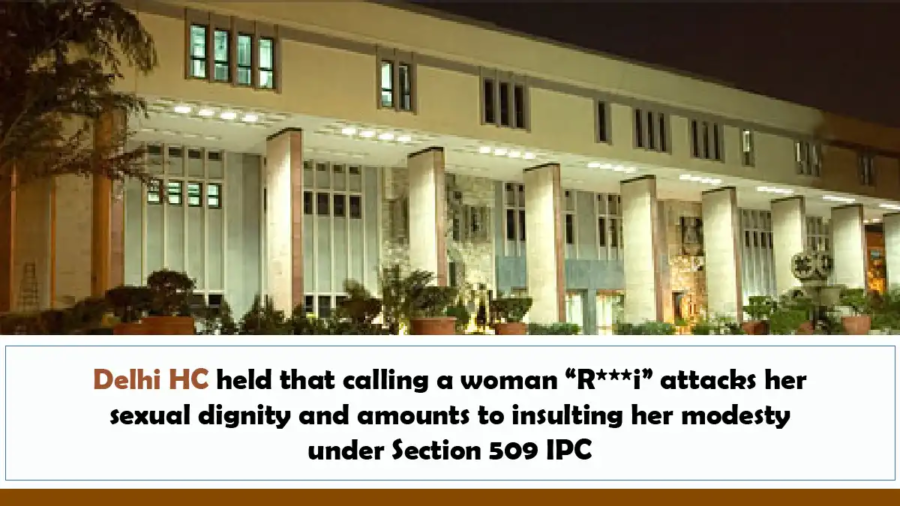Delhi HC held that calling a woman “R***i” attacks her sexual dignity and amounts to insulting her modesty under Section 509 IPC
Facts of the Case
The petitioner, Vice-Principal of a school in Delhi, alleged that on 5 July 2013 she discovered her attendance record had been mutilated with red ink. When she went to the Principal’s office to address the issue, she found three staff members, identified here as X, Y, and Z, along with the Principal. She alleged that the Principal used abusive language, made obscene remarks, and attempted to assault her. She further alleged that X made obscene remarks and shameful gestures, Y abused her in indecent language and mocked her, and Z attempted to overpower her.
The petitioner complained to the school management, but no action was taken. On 21 July 2013 an FIR under Section 509 IPC was registered at Police Station Moti Nagar, Delhi. After investigation, the trial court framed charges only against the Principal under Sections 509 and 352 IPC while discharging X, Y, and Z on the ground that they were not named in the initial complaints and the allegations against them lacked specificity. The discharge was upheld by the Sessions Court on 1 November 2018. Aggrieved, the petitioner approached the High Court challenging the discharge.
Contentions of the Petitioner
The petitioner argued that the courts below erred in discharging X, Y, and Z. She submitted that in her subsequent complaint made immediately after the incident she specifically named them as present in the Principal’s office and participating in the abuse. She contended that X had called her “r***i,” which was not a casual abuse but a direct attack on her character and dignity as a woman. She urged that the abusive conduct of all three respondents fell squarely within the ambit of Section 509 IPC and charges ought to be framed against them.
Contentions of the Respondents
The respondents supported the findings of the trial court and the Sessions Court. They argued that the petitioner’s allegations were inconsistent and belated since her first two complaints did not name them or record the exact words used. They maintained that the language attributed to Y and Z, such as calling her “saali” or threatening her with denial of promotion, lacked any sexual connotation. They relied on judicial precedents to argue that mere abusive or coercive remarks without sexual intent do not constitute an offence under Section 509 IPC.
Court’s Observations
Justice Swarana Kanta Sharma examined the allegations separately against X, Y, and Z. With respect to Y and Z, the Court noted that the allegations were that they called the complainant “saali,” accused her of “talking rubbish,” and threatened that she would be denied promotion or removed from service. The Court held:
“The threats of withholding promotion or throwing the petitioner out of employment also, though coercive and intimidating, are not linked with any sexual dignity of the petitioner and thus cannot be said to fall within the ambit of offence under Section 509 of IPC.”
The Court therefore found no ground to interfere with their discharge.
However, regarding X, the Court observed that the allegation that he had called the complainant “r***i” could not be dismissed as casual abuse. Justice Sharma held:
“The use of such an expression cannot be regarded as a mere abuse or a casual insult. The word, when directed towards a woman, is laden with sexual innuendo and directly imputes unchastity to her. It is not a casual term of abuse but one which specifically attacks a woman’s character by questioning her sexual dignity and portraying her as of loose moral character.”
The Court emphasized that the essence of Section 509 IPC lies in the intent to insult the modesty of a woman and that modesty is tied to the dignity associated with her sex. It concluded that the allegation against X prima facie attracted Section 509 IPC.
Court’s Order
The High Court partly allowed the petition. It set aside the discharge of X and directed that charges under Section 509 IPC be framed against him. It upheld the discharge of Y and Z since their conduct, though offensive, lacked the sexual intent required under Section 509 IPC. The Court clarified:
“Taking a prima facie view of the material on record, this Court is of the considered opinion that a charge under Section 509 of IPC can indeed be framed against respondent no. 2. Whether in the given facts and circumstances, such expression actually resulted in outraging the modesty of the petitioner, is however a matter of trial.”
Accordingly, the petition was disposed of with directions to proceed against X under Section 509 IPC, while maintaining the discharge of Y and Z.
Written by Adv. Deeksha Rai



